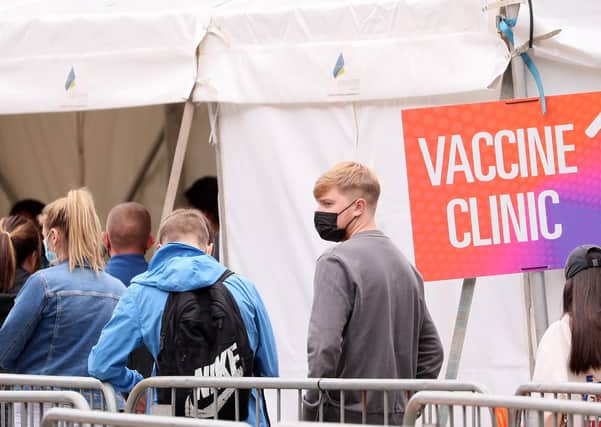Covid boosters and flu jabs for the vulnerable could start next month


Dr Tom Black, who chairs the British Medical Association in Northern Ireland, told the News Letter medics are hoping to get this year’s flu vaccine and coronavirus booster vaccine roll-outs started in September.
He also revealed that doctors fear a “big outbreak” of flu this winter could be coupled with another surge in coronavirus infections, along with other respiratory illnesses that often circulate in winter.
Advertisement
Hide AdAdvertisement
Hide AdDr Black said there are “a lot of unknowns” with the flu this year, with coronavirus lockdowns around the world having driven usual influenza infections rates down.
The lack of flu circulating in countries such as Australia and New Zealand, who provide medics on this side of the equator with an early warning of which strains to target with the vaccine programme, could make our efforts to innoculate the vulnerable “less reliable”.
He also expressed concern that, with lower rates of flu circulating thanks to lockdowns and other infection control measures here, people’s “natural immunity” to flu could be weakened through the lack of exposure to the virus.
Asked if infectious disease outbreaks could mean another lockdown is required in Northern Ireland, Dr Black didn’t rule out the possibility but stressed that it remains too early to tell.
Advertisement
Hide AdAdvertisement
Hide Ad“Only time will tell,” he said. “What we’ve learned over this summer is that we’ve managed to reduce the number of admissions, even though the infection rate is as high as it was last winter. The admission rate to hospital hasn’t been as high and that’s because of the vaccination programme.”
He continued: “I think the big focus for the health service now, in terms of vaccinations, will be to get the boosters done for the clinically vulnerable and the elderly going into winter. What we’re dealing with at the moment with the 400-odd people in hospital and the 40-odd people in intensive care is difficult, it’s really causing a lot of work in the NHS. But you always have to look ahead and ask will there be a problem in winter? The problem will be another wave of infections in winter, in addition to the respiratory syncytial virus (RSV) in children, and the fact that we’ve not had big outbreaks of influenza. We’re worried that there might be a big outbreak of influenza this winter, so we’re hoping to get the boosters and the influenza campaign started in September.”
Explaining how the lack of flu circulating globally could pose problems this winter, he said: “The vaccination programme we always look at is based on the variant that was circulating the previous winter in the southern hemisphere.
“You look and see which would be the most likely variants to come through. Very often, our flu vaccination programme targets two, three and even four variants to try and cut across the risk.
Advertisement
Hide AdAdvertisement
Hide Ad“Obviously Australia, New Zealand and countries like that won’t have had a lot of influenza over the last year to give us an indication as to what is likely to come here.
“So it’s probably not as reliable as it has been in the past, but of course it’s still worth doing.
“The other problem we have this year is because there haven;t been high rates, people’s natural immunity to the flu will have decreased, just as natural immunity to RSV has decreased.”